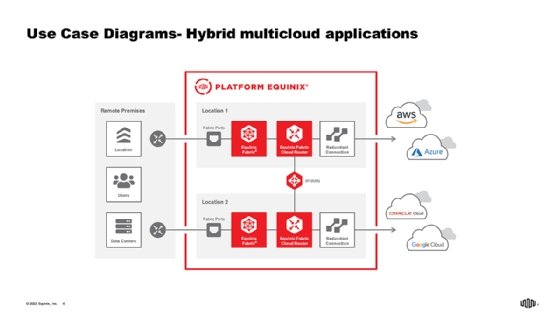
Getty Images/iStockphoto
Equinix Fabric adds multi-cloud routing
Equinix markets its Fabric Cloud Router as a monthly subscription service that organizations can access and configure quickly. It includes an SLA for 99.999% uptime.
Equinix has made its virtual routing service generally available, giving enterprises that lease the company's data centers the option of using an in-house service to connect to multiple clouds.
Equinix broadened the availability of Fabric Cloud Router this week. The service provides Layer 3 connectivity to AWS, Google Cloud, Microsoft Azure and Oracle Cloud.
Fabric Cloud Router can also send data to hundreds of other service providers, including content delivery company Akamai, videoconferencing service Zoom and ServiceNow, a cloud-based system for automating IT management workflows, Equinix said.
The colocation provider markets its Fabric Cloud Router as a monthly subscription service that organizations can access and configure quickly. The service simplifies routing to cloud and service providers by eliminating the need to license and operate a virtual or physical router, according to Equinix.
Fabric Cloud Router includes a service-level agreement for 99.999% uptime.
"[Fabric Cloud Router] looks like it can save some money and is quick and easy; they claim less than a minute to deploy," said Bob Laliberte, an analyst at TechTarget's Enterprise Strategy Group (ESG).
Fabric Cloud Router will compete with the Megaport Cloud Router. Equinix said its service can provide bandwidth connections up to 50 Gbps in certain areas, compared with Megaport's limit of 10 Gbps as of today.
Equinix routes traffic on a distributed forwarding plane, which means it sends data from the data center to the destination. With Megaport, data travels first to Megaport's centralized cloud router, which sends it to the final destination over the company's virtual points of presence.

Equinix adds infrastructure services
Equinix has expanded its data center leasing business to include services that help enterprises tackle the increasing infrastructure complexity brought on by operating workloads between private data centers and cloud providers, said Arun Dev, head of digital interconnection at Equinix. Cloud providers do not standardize connectivity, making the process difficult for customers.
Equinix expects the need for cloud interconnectivity to increase as enterprises deploy private generative AI that keeps sensitive data out of the cloud while also taking advantage of services offered by cloud providers, Dev said.
"[Enterprises] want the data close to the clouds, but not in the clouds," Dev said.
He added that AI is part of most conversations with Equinix customers.
A survey of 350 North American IT professionals by ESG found that organizations expect to keep a quarter of their applications and workloads on-premises over the next five years. Companies found that private data centers were more cost-effective for running low-latency, high-performance applications like AI.
"The public cloud delivers tremendous transformational benefits, but the finding is application environments are incredibly diverse in terms of the data and the workloads," ESG analyst Scott Sinclair said. "And because of that, it makes sense for organizations to leverage the best technology, regardless of its location."
To support AI applications, which consume more power and generate more heat than traditional workloads, Equinix recently unveiled plans to roll out liquid cooling systems in 100 data centers in 45 metro areas globally. The company has a total of 250 data centers in 71 metro areas.
Enterprises increasingly want to access services and technology at Equinix data centers through usage-based subscription services, Dev said. "When they come to Equinix, they expect a cloud-like experience."
Equinix offers two Fabric Cloud Router packages. The Lab tier, available at no charge, includes 10 virtual connections at up to 50 Mbps each and caps the number of IPv4 and IPv6 routes at 50 each. The Standard tier has no limit on 10 Gbps virtual connections for $1,200 a month.
In the first half of the year, Equinix plans to launch an advanced package with more services, such as route filters and partnerships with security vendors, Dev said.
Antone Gonsalves is an editor at large for TechTarget Editorial, reporting on industry trends critical to enterprise tech buyers. He has worked in tech journalism for 25 years and is based in San Francisco.






